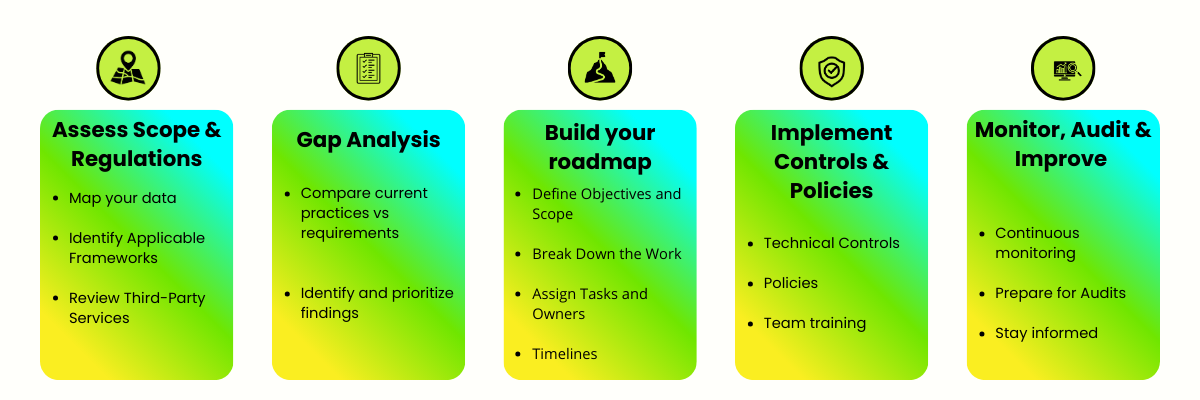What are the steps toward compliance?
Learn the essential steps toward achieving compliance with SOC 2, ISO 27001, or GDPR. Build a compliance roadmap that unlocks enterprise deals.
Navigating business compliance is an overwhelming but essential challenge for startups, as adhering to standards like GDPR, SOC 2, and ISO 27001 is crucial for building customer trust and securing enterprise deals. Managing these requirements manually is often a chaotic, resource-draining process that pulls engineers away from product development and risks costly errors or missed deadlines. The key is to shift from a reactive approach to a proactive one by building a clear, step-by-step technical roadmap, which transforms compliance from a source of stress into a manageable project.
Key Takeaways
- Compliance is a Growth Engine: For startups, achieving compliance with frameworks like GDPR, SOC 2, or ISO 27001 is a strategic necessity. It’s the key to unlocking enterprise deals, satisfying legal requirements, and building the foundational trust needed to win customers.
- A Tailored Roadmap is a Must: Avoid generic, one-size-fits-all templates. The right approach is a tailored program built for your specific business and tech stack, which involves assessing your unique risks, creating relevant documents, and implementing controls that actually matter.
- Expert Guidance Frees Up Your Team: Manually handling compliance can be a significant drain on a startup’s most valuable resource: its engineering team. Partnering with compliance experts transforms the process from a complex internal burden into a managed journey, allowing your team to stay focused on building your product.
If an expert-led approach is right for you, Probo is here to manage that journey.
Why Compliance is Critical for Your Startup
Before building a roadmap, it’s crucial to understand the fundamental business drivers behind compliance. For a startup, this isn’t just about following rules; it’s a strategic imperative for growth and survival.
- It unlocks enterprise deals. Many large companies are unwilling or unable to do business with vendors who lack security certifications like SOC 2 or adherence to GDPR. Compliance is often a non-negotiable prerequisite to get past security reviews and close high-value contracts.
- It’s a legal requirement. Depending on your industry and where your customers are, compliance isn’t optional. Regulations like GDPR and HIPAA carry the risk of severe financial penalties, which can be devastating for an early-stage company.
- It builds foundational trust. Security and privacy are no longer afterthoughts for customers. A commitment to compliance is a powerful way to demonstrate that you take data protection seriously, building the essential trust needed for users to adopt your product.
- It creates a competitive advantage. In a competitive market, being able to prove your security posture can set you apart. It signals maturity and stability to investors and customers, giving you an edge over less prepared competitors.
Building Your Compliance Roadmap

Here is a practical, step-by-step guide to creating your compliance roadmap.
Step 1: Assess Your Scope and Identify Regulations
Before you can build a plan, you need to understand the landscape.
- Map Your Data: Identify and categorize all the data your product collects, processes, and stores. Pay special attention to personal or sensitive data. Create a data flow diagram to visualize how information moves through your systems.
- Identify Applicable Frameworks: Based on your market, industry, and data types, determine which regulations apply to your business. This could include GDPR, SOC 2, HIPAA, or others.
- Review Third-Party Services: List all third-party vendors and APIs that handle your data. You are responsible for their compliance, so ensure they meet the necessary standards.
Step 2: Conduct a Gap Analysis
With a clear understanding of the requirements, you can now evaluate your current posture.
- Review Current Practices: Compare your existing policies, procedures, and technical controls against the specific requirements of the regulations you identified.
- Document the Gaps: Create a detailed list of every area where your current practices fall short of the compliance requirements.
- Prioritize Findings: Not all gaps are equal. Prioritize them based on risk level and the effort required to fix them. High-risk areas, like data encryption and access controls, should be at the top of your list.
Step 3: Create a Detailed Roadmap
Turn your gap analysis into an actionable project plan.
- Define Objectives and Scope: Clearly state the goals of your compliance project. For example, “Achieve GDPR compliance for our main application by the end of Q4.”
- Break Down the Work: Divide the project into smaller phases or milestones, such as “Implement Access Control Policy” or “Develop Incident Response Plan.”
- Assign Tasks and Owners: For each phase, define the specific technical tasks required. Assign each task to a team member to ensure clear accountability.
- Estimate Timelines and Resources: Set realistic deadlines for each task and milestone. Identify the budget, tools, and personnel needed to get the work done.
Step 4: Implement Controls and Develop Policies
This is where you put your plan into action.
- Implement Technical Controls: Your engineering team can now begin implementing the necessary technical safeguards identified in your roadmap. This could include setting up logging, enforcing multi-factor authentication, or encrypting databases.
- Develop Formal Policies: Create and document clear policies and procedures. These should cover topics like data protection, access control, and incident response.
- Train Your Team: A compliant culture is essential. Conduct training sessions to ensure every employee understands their role in protecting data and following company policies.
Step 5: Monitor, Report, and Improve
Compliance is not a one-time project; it is an ongoing process.
- Establish Monitoring: Set up systems to continuously monitor your controls and detect potential issues in real time.
- Prepare for Audits: Regularly conduct internal reviews to ensure your controls are working as expected and that you are prepared for an external audit.
- Stay Informed: Regulations change. Create a process for staying up to date on new requirements and adapting your compliance program accordingly.
How Probo Helps with Compliance
Probo is your dedicated compliance team, providing a hands-on, expert-led service to manage the entire process for you. We transform compliance from a complex burden into a clear, manageable journey.
A Truly Tailored Program
We don’t use generic templates. We start by talking to you to understand exactly how your business and tech stack work. Based on that conversation, we build your compliance program from the ground up.
- Context-Driven Documents: We create the right documents (policies, inventories, and risk analyses) that perfectly match your ways of working.
- Relevant Checklists: You get a practical, tailored checklist of security controls that are necessary for your specific operations, not a list of generic, irrelevant tasks.
Expert-Led, “Done-For-You” Service
We handle the heavy lifting of compliance so you can focus on building your product. Our team acts as your in-house compliance experts.
- We Do the Work: We handle the creation of documents, evidence collection, and even manage relations with auditors on your behalf.
- Full Lifecycle Support: From the initial conversation to getting you audit-ready and maintaining your compliance in the background, we are with you every step of the way.
Complete Transparency and Ownership Our approach is built on trust and transparency, ensuring you are always in control.
- Open-Source Foundation: As an open-source platform, we offer complete transparency with no vendor lock-in.
- You Own Your Data: You always own your compliance documents and data, giving you full control and peace of mind.
Conclusion
Navigating the path to compliance is a critical step for any startup ready to scale. While a structured roadmap provides the necessary steps, the journey can be complex and resource-intensive when managed alone. This is precisely where Probo steps in. Our hands-on, expert-led service is designed to manage the entire process for you from creating a tailored program that matches your ways of working to handling auditors on your behalf. By partnering with Probo, you transform compliance from a daunting obstacle into a strategic asset, building the foundation of trust and security you need to close bigger deals and grow with confidence.
